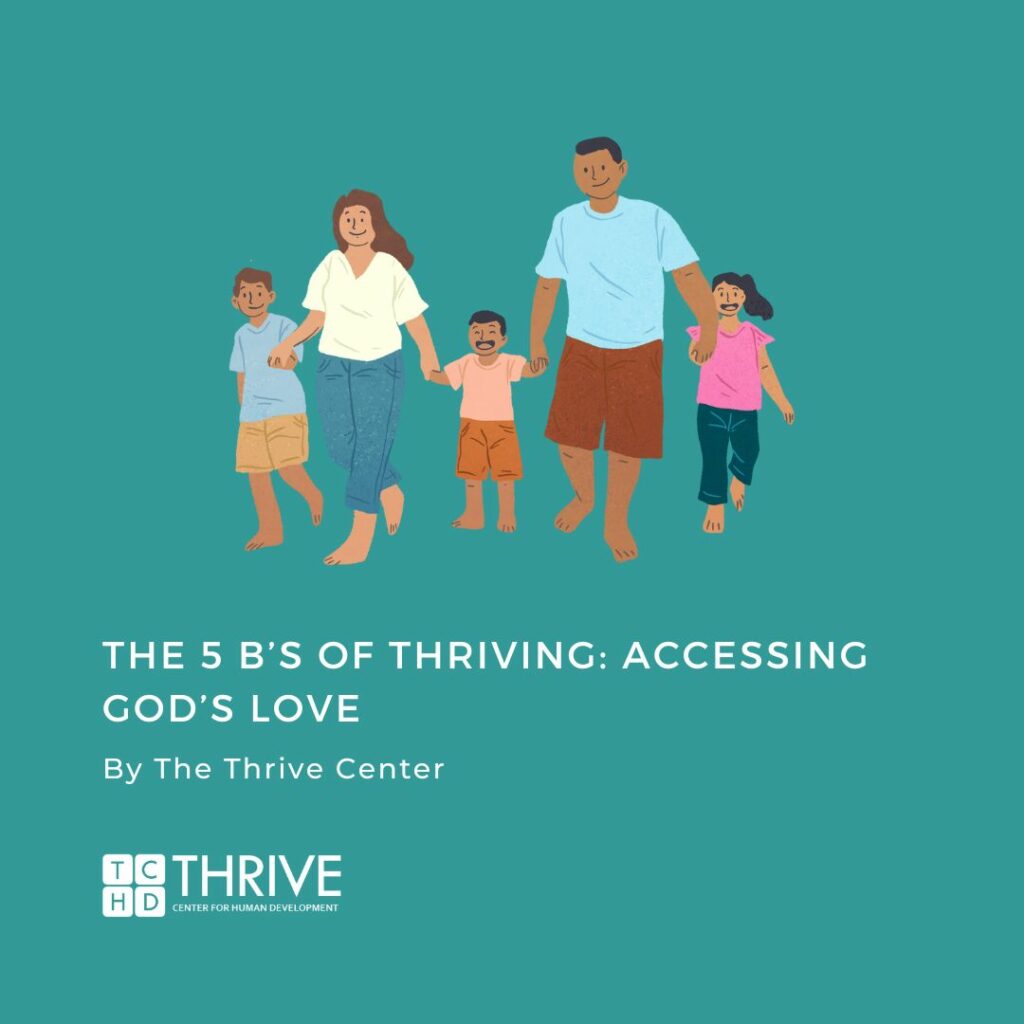I am often asked about strategies for thriving. “How do I thrive?” “What practices help with thriving?” Thriving is complicated, and individuals thrive differently. However, I have a simple answer to the question of how to thrive. Offer more love. Love provides heart and motivation for the growth and contribution so essential for thriving – the love of God, the love of others, and the love of self.
Christian faith offers a powerful narrative around love – we are beloved. We are worthy of love, and our lives matter. We have roles to play in God’s work in this world. Surrendering to God’s love allows us to be present with God, as we are, with all our imperfections. Receiving and offering love invigorates us with powerful positive emotions to keep us connected to what matters. Practices that deepen and broaden our beliefs about a loving God, such as reading sacred texts or keeping a gratitude journal, provide comfort and resilience through times of difficulty.
Tap into love beyond the self in order to nurture a sense of vital transcendence. Christians experience God’s love in many ways. While this could mean attending church services, it could also mean volunteering at a local food bank, raising money for a cause, spending time in nature, or simply visiting a loved one. There are many ways to access transcendence, but opening yourself to love is most important.
In a recent study, however, 79 percent of young adults reported strong feelings of loneliness. Feelings of isolation are associated with stress, illness, decreased well-being, and depression. “Being able to feel safe with other people is probably the single most important aspect of mental health…being truly heard and seen by the people around us, feeling that we are held in someone else’s mind and heart,” is vital for our well-being (The Body Keeps the Score, B. Van der Kolk, Penguin Books, 2014, p. 81). In fact, research shows that the quality of our relationships is even more important for our well-being than diet or exercise.
Experiencing a true sense of belonging is a vital source of love. Good relationships must be cultivated. Even if we don’t initially feel loving or connected, we can choose to offer love and compassion. Pay attention. Listen carefully. Choose to find the support you need. Spend time with people who love you fully as yourself. Cultivate relationships where the love you offer is received and reciprocated. If you are experiencing isolation, find a community or group activity that gives a sense of belonging. A sense of belonging provides purpose and meaning, so find your people. God speaks to us through others and our actions are how God speaks through us. Thriving involves understanding and contributing our unique gifts and talents toward something bigger than ourselves.
Our bodies play an important role in experiencing and offering love to others. Research continues to reveal how our “bodies keep the score” and how our experiences–both good and bad–influence how we feel love. We store our pain in our muscles and organs. We feel happiness in our hearts and minds. Humans have a tremendous capacity for empathy, so much so that we are capable of feeling each other’s emotions. We cry when others cry. We feel happy when others are happy, and there is nothing like that blast of joy when we are reunited with those we love. Our bodies respond. We hug, we kiss, we laugh.
Science is just beginning to discover how we can intentionally engage our emotions in more life-giving ways. A simple practice where we focus on our breathing helps us slow down, be present in the moment, and access what we are feeling. Scanning our bodies helps us examine where we hold our emotions. We might feel tension in our jaws or butterflies in our bellies. A simple pause allows us to consider the emotion and make a more deliberate decision about how to respond, particularly important when facing a challenging person or situation. The pause provides space between the feeling and the action. Intentionally deciding how to respond improves how we relate to others. It’s a way to choose love.
Finally, creation is a thing to behold. The pattern of a child’s eyelashes, or the intense blue of the sky – our planet is beautiful, and beauty surrounds us. Spend time focusing and being captivated by beauty. Whether nature or art or music captures your attention and heightens your senses, take time to relish moments of awe and wonder. These experiences elevate positive emotions and draw us closer to ourselves, God, and others. Experiencing beauty makes us grateful for this life we have on earth.
The activities outlined in this post function like nutrients for your brain – both calming and joyful ways to help regulate and mobilize you toward purpose. When we feel like we matter, both through the experience of being known by God, and appreciated by others, as well as the intentional experience of knowing and loving others, we are able to thrive. When in doubt, offer more love.
For specifics on living out love through the 5 B’s, read the 5 B’s of Thriving.

Your Free Download
Thriving is a process of transformation that requires us to actively develop our body, beliefs, a sense of belonging, a sense of beauty, and an orientation beyond the self. Here’s a printable PDF of the 5 B’s of Thriving to serve as a daily reminder.
Continue Exploring

Emotions
Good Grief: Why We Grieve & What Gets in the Way
Grieving allows us to process the emotions of a loss, accept change and transition in our lives, and adapt to, learn from, and grow into new ways of being.

Emotions
Suffering in Parenthood
Parenting brings unique forms of suffering. How does accepting that we suffer help us?

Emotions
How are mental, physical, and spiritual health related?
Physical, mental and spiritual health are interconnected as part of holistic health, with each facet influencing the health of the others.

